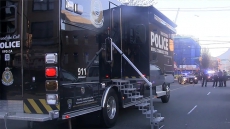OTTAWA - Military members accused of serious offences under military law do not have a constitutional right to jury trials, the Supreme Court ruled Friday.
The Charter of Rights and Freedoms guarantees Canadians a right to a jury trial for serious offences carrying a maximum sentence of five years or more, except in the case of "an offence under military law tried before a military tribunal."
In a 5-2 decision, the Supreme Court upheld a section of military law that allows Canadian Armed Forces members to be charged in the military system for civilian offences in the Criminal Code, such as sexual assault, or other federal statutes.
The decision says soldiers charged under offences in that section fall under the military exception in the charter, and thus have no right to jury trials.
The decision restores clarity to a military-justice system that had been thrown into chaos after a military appeals court ruled last year that soldiers did in fact have a right to jury trials for some serious offences.
Speaking to reporters after the decision was released, Col. Bruce MacGregor, the military's chief prosecutor, said the ruling "further legitimizes the military justice system" and that the military justice system would be able to return to properly holding members of the military to account.
After the ruling of the military appeals court in 2018, the military was forced to send multiple cases to provincial civilian courts, MacGregor said, and several of those cases had to be abandoned altogether once they reached civilian jurisdictions.
Earlier this month, The Canadian Press reported 18 court-martial cases, most involving charges of sexual assault, had been referred to civilian courts — and four were subsequently dropped. The military itself abandoned three cases relating to drug and fraud charges, and reduced or changed the charges in 15 other cases.
The Supreme Court decision released Friday dealt with multiple cases in which military members accused of serious offences like sexual assault and forgery argued that the exception in the charter should apply to only "pure" military offences, like spying.
The soldiers said the section of military law that transforms civilian offences into "service offences" deprived them of their right to a jury trial, in violation of the Charter of Rights and Freedoms.
But the majority on the Supreme Court found that the exception in the charter applies because the transformation of civilian offences into military ones was done through a validly enacted and constitutional section of military law.
That section is "not inconsistent" with the Charter because “it does not deprive a person who is lawfully entitled to a jury of that right," the court's majority opinion said.
The opinion, written by Justices Michael Moldaver and Russell Brown, also said the only connection required to pursue a case in the court martial system was that the person charged is a military member.
The court’s dissenting opinion, written by Justices Andromache Karakatsanis and Malcolm Rowe, argued a military connection should be established for offences in the military system, and a jury trial allowed when the serious offences involve no military connection. They said a test should be created to determine the level of connection between a case and its relevance to the military.
The majority argued that a test to establish a military connection would not be consistent with other aspects of the law. Their opinion said such a test would require courts to undergo an "unwieldy" process, and potentially impair the goals of maintaining discipline, efficiency and morale in the military.
Friday's ruling does not eliminate the possibility of military members being charged in civilian courts and before civilian juries.
Under the existing system, Canadian Armed Forces members may undergo trials before a judge and a panel of five others in uniform, rather than a jury of 12 of their peers.
But military prosecutors still have the discretion to send cases to civilian courts, weighing criteria such as community interest in the case and the views of victims.
This constitutes something similar to a test of military connection, the majority wrote, but determined military prosecutors retain the jurisdiction given to them by the courts — including over serious civilian-turned-service offences — regardless of how they choose to exercise that power in practice.

